Big thanks to all of you who commented on the Grace Lin interview!
I'm happy to report we've picked the winners of two signed, personalized copies of The Year of the Rat!
Friends, I want you to know this was not an easy task.
For one thing, some of the kitchen helpers grew overly fond of the prize:
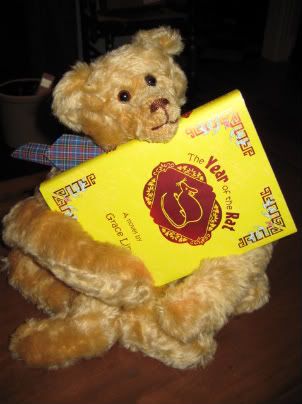
Julius cherished it.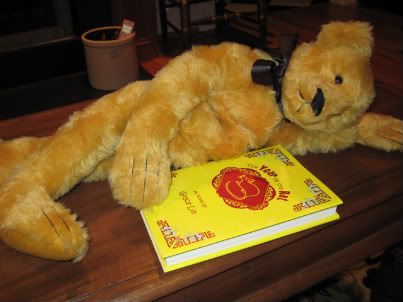
Mr. Bear slept with it.
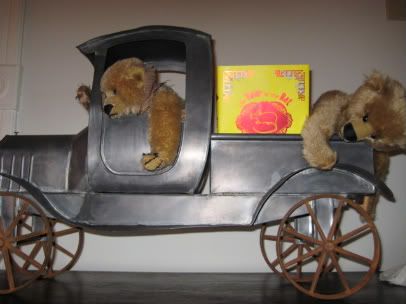
Buddy and Brogan tried to hijack it.
And, when I looked around for help, everyone was too busy.

Becky was scarfing down candied ginger.

So was Pudding.

Who let Skippy into the kitchen?
Others were obsessed with reading beautifully illustrated books:
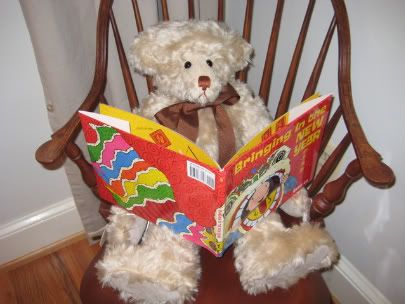
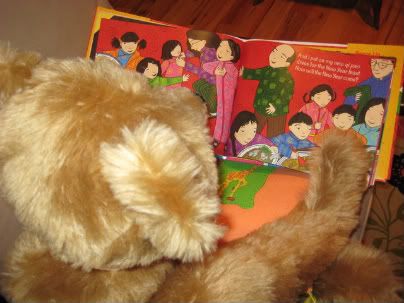
So I took matters into my own hands.
First, I assigned a number to all 33 commenters.
Then, I wrote the numbers inside foil baking cups: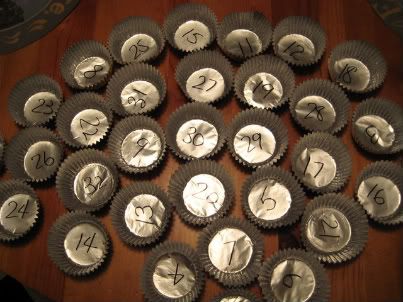
Next, I folded them up like little dumplings, tossed them into a bamboo steamer, and waited until they were perfectly done:

Just then, our official alphabet soup impartial volunteer returned from Whole Foods just in time to fish out the winners:

And they are: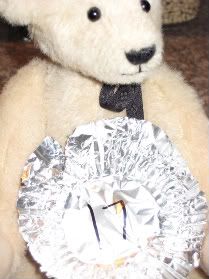

#17 - Jeannie C. #4 - Kristi Valiant
CONGRATULATIONS!! YAY!! WOOHOO!!
Jeannie and Kristi, please email me with your mailing addresses and personalization info: readermail *at* jamakimrattigan *dot com*!
Thanks again, everyone!!
Viewing: Blog Posts Tagged with: Afghanistan, Most Recent at Top [Help]
Results 1 - 5 of 5
Blog: jama rattigan's alphabet soup (Login to Add to MyJacketFlap)
JacketFlap tags: tea party month, grace lin winners, Add a tag
Blog: La Bloga (Login to Add to MyJacketFlap)
JacketFlap tags: peace, Pakistan, Islam, Afghanistan, Afghanistan, Islam, Add a tag
NY: Viking, 2006.
ISBN (hardcover) 0670034827 9780670034826
ISBN (paper) 9780143038252
Michael Sedano
An interesting variation in the subtitle of David Oliver Relin’s telling of Greg Mortenson’s story illustrates two ways to sell the book. The hardcover book calls itself “One man’s mission to fight terrorism and build nations-- one school at a time.” The paperback edition titles itself, “One Man's Mission to Promote  Peace . . . One School at a Time.”
Peace . . . One School at a Time.”
The work offers a creative nonfiction account of a mountaineer who stumbles off the Himalayan peak K2 in 1993. Taking a life-threatening wrong path, he stumbles into an unmapped village far from his intended landing. It’s a life-changing error, both for the mountaineer and the villagers who save Mortenson’s life.
During his recuperation in the village, Mortenson observes the village girls conducting school in the open air because they have no teacher nor a structure. He promises to return and build the girls a school. The adventurer’s gratitude takes on missionary zeal and he cannot stop with the one promise, instead devoting his career to building schools for girls across rural Pakistan. By September 11, 2001, Mortenson’s success has led him to Afghanistan, where he runs afoul of the Taliban, opium traders, moujahedeen, and the CIA. Here is the source of the spin given by the hardbound subtitle as the final chapters of the story focus on Mortenson’s experiences in Afghanistan. It’s an inescapable perspective, but the paperback volume’s subtitle about peace more accurately describes the likely outcome of Mortenson’s actions had there been no attack by the U.S., and a workable strategy should our nation choose alternatives to invasion and religious enmity.
The girls and villages benefiting from Mortenson’s work are Muslim. Mortenson is the son of Christian missionaries and not a convert to Islam. While religious schism plays little role in Mortenson’s commitment, it informs the story in surprising ways. The fathers and village men do not oppose education for their girls, yet one conservative cleric declares fatwa on Mortenson’s efforts, preventing building schools in the region. All of Mortenson’s local supporters are Muslim, too, but are powerless to intercede directly on his behalf. Instead, they petition the “supreme leader” of the Shia in northern Pakistan, who not only declares the fatwa inconsistent with Islam, Syed Abbas offers his wholehearted support to Mortenson’s project.
The story of Mortenson’s various projects fills the book with numerous emotional peaks. Dismal stories of government incompetence, generations of neglect, and abject poverty are sure to be depressing. Then, when the reader gets to see villagers hauling heavy loads up steep mountain tracks, followed by frantic construction ahead of winter culminating in the opening of a girl’s school, knowing that these children’s lives have changed forever is sure to bring tears to all but the most cynical eyes.
Three Cups of Tea offers a compendium of intercultural communication. “Dr. Greg,” as Mortenson is known, adapts to local custom. A natural linguist, he becomes proficient enough to earn the honor explained by the title. Mortenson’s second father, Haji Ali, teaches him that the first cup of tea taken with a villager is taken as a stranger and given out of obligation. The next cup is offered for a guest. The third cup makes one a member of the family.
Perhaps guilelessness helps. In one frightening instance, Mortenson disregards a friend’s advice never to travel alone. He finds himself imprisoned by a warlord and seems at risk of being executed. Beheading has not yet reached the news, so Mortenson fears only being shot. He doesn’t speak the captor’s tongue—he is blazing a trail into new territory—and requests a Koran. Having learned the proper manner of ablution from one informant, and how to read the pages from an illiterate, Mortenson makes a favorable impression. Doubtlessly, the captors have checked out Mortenson’s background and they release him.
Mortenson’s good works created a good name for “Dr. Greg.” As he advances into Afghanistan’s northern frontier, he goes in search of the principal commandhan of Badkshan, a man described as tying spies between two jeeps and pulling their bodies apart, the fiercely reputed Sadhar Khan. Alone and lacking any documentation, having sneaked into town hidden under rotting goat hides, Mortenson approaches a jeep of substantial appearing men. In a strange coincidence, or perhaps a bit of fiction has sneaked under the radar here, when Mortenson says he’s looking for Sadhar Khan, the driver says he is Khan! After a few moments explaining why he’s here, Khan shouts, “You’re Dr. Greg!” A couple years earlier, some riders had appeared near the Pakistan border after an eight day ride, beseeching Mortenson’s building a school for their village. Mortenson had promised he’d see what he could do and was in Badkshan looking to keep that promise. The riders were employees of Sadhar Khan, and they had related the story of the schools and water projects Dr. Greg was fomenting.
Three Cups of Tea has won numerous prizes. The CAI, Central Asia Institute, lists them on their website:
Kiriyama Prize - Nonfiction Award, Time Magazine - Asia Book of The Year, Pacific Northwest Booksellers Association - Nonfiction Award, Borders Bookstore - Original Voices Selection, Banff Mountain Festival - Book Award Finalist, Montana Honor Book Award. Throughout the book, however, come allusions to the ultimate prize, the Nobel Peace Prize. Cynics might point to the softcover subtitle as evidence of a campaign to garner that for Mortenson and his CAI. The hagiographic treatment of Dr. Greg’s career might offer support for that view, if not for the actual good that inheres in building schools for girls in the middle of a culture that putatively forbids that type of education.
There may be a segment of reader who would dismiss Three Cups of Tea as one of the “blame America first” crowd. The “fighting terrorism” spin might support that view. For example, as the book draws to a close we see Mortenson meeting Donald Rumsfeld and being fascinated by the man’s expensive and highly polished shoes. Mortenson addresses a military audience at the Pentagon and relates the contradiction between the U.S. war machine and the need for security, telling them:
“these figures might not be exactly right. But as best as I can tell, we’ve launched 114 Tomahawk cruise missiles into Afghanistan so far. Now take the cost of one of those missile tipped with a Raytheon guidance system, which I think is about $840,000. For that much money, you could build dozens of schools that could provide tens of thousands of students with a balanced nonextremist education over the course of a generation. Which do you think will make us more secure?”
Mortenson has his day before the military to no impact, except for a man who offers him unlimited funds to build schools. But Mortenson recognizes his doom would come from any association with the military and he turns down the bribe. Later, he discusses terrorism and security with a Pakistani Major General. They are watching CNN images of civilian casualties in Baghdad. (p. 310)
“Your President Bush has done a wonderful job of uniting one billion Muslims against America for the next two hundred years.”
“Osama had something to do with it, too,” Mortensen said.
“Osama, baah!” Bashir roared. “Osama is not a product of Pakistan or Afghanistan. He is a creation of America. Thanks to America, Osama is in every home. As a military man, I know you can never fight and win against someone who can shoot at you once and then run off and hide while you have to remain eternally on guard. You have to attack the source of your enemy’s strength. In America’s case, that’s not Osama or Saddam or anyone else. The enemy is ignorance.”
To writer David Oliver Relin’s credit, he controls the political spin exemplified here, spinning out just enough politics to contrast with the warmth and love that fill the first two hundred pages of the book. It’s clear why the hardcover came out with the “fighting terrorism” tag, given the closing pages’ focus on the existing conditions Mortenson works under. That he’s continuing the work building schools for girls in Muslim countries—and finding support from religious and ordinary citizens—is truly encouraging. Wouldn’t it be great if some reader in political authority is reading and learning the cultural lessons of this hopeful book?
That’s the final Tuesday of leap year February. La Bloga welcomes your comments and responses to what you read, or don’t read here. And, as we frequently offer, we welcome guest columnists. Let us know by leaving a comment, or email here, that you have something to say.
Ate,
mvs.
Blog: Crazy For Kids Books (Login to Add to MyJacketFlap)
JacketFlap tags: refugee camps, friendship, peace, Pakistan, Afghanistan, refugee camps, Afghanistan, Add a tag
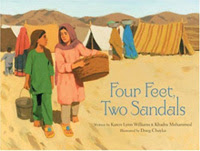 It's hard for children to understand that life for other children around the world can be so different from their own experience. Most American children have a home and clothes and go to school. Four Feet, Two Sandals puts a human face on the refugee crisis around the world. Even though this story focuses on a refugee camp on the Afghanistan/Pakistan border, it is a story that could be placed in any refugee camp.
It's hard for children to understand that life for other children around the world can be so different from their own experience. Most American children have a home and clothes and go to school. Four Feet, Two Sandals puts a human face on the refugee crisis around the world. Even though this story focuses on a refugee camp on the Afghanistan/Pakistan border, it is a story that could be placed in any refugee camp.
This story of friendship found in the most unlikely of places reflects the experience of many refugee children and is, in fact, based on real experiences of the authors. It is a testament to how strong our human need for connection and friendship actually is. When a family is displaced, separated from their home, community, extended family and without a means to support themselves, they become dependent on the kindness of governments and relief organizations. Without control over where they will be relocated, some refugees can live in camps for years.
To realize that friendship can spark and live in a place of such uncertainty and fear is a powerful story of hope and survival. And one which all children should learn about and understand. No matter how bad our situation is, we always have a choice about how to respond to others. We choose whether to stand together or apart.
Refugee camps have some similarity to real life as there are always the routines of every day life that need to be created. Gathering water, washing clothes, cooking food, and care of the family. Impermanance, insecurity and fear fuels the concerns and conversation of everyone living in a camp. Caught between an old life that is gone forever and a new life that cannot yet be glimpsed is frightening.
Yet in the midst of that, two girls find each other and share a pair of shoes. Their friendship helps them humanize their situation reminding them that there are still wonderful things that life will offer them. Illustrator Doug Chayka uses soft, warm colors to convey the desert, tents, primitive conditions, and clothing of the people in the camp.
This is a wonderful story of friendship and hope that should be shared as widely as possible. When we know the face of the "other", we are more likely to greet them as friends than as enemies.
Blog: Just One More Book Children's Book Podcast (Login to Add to MyJacketFlap)
JacketFlap tags: review, Podcast, Community, Family, Ages 4-8, Formal, Compassion, Creativity, Fairy tales and legends, Picture book, Friendship, Appreciation, childrens book, Fun, Animal, Life Skills, Freedom, Hilarious, Humour, Man, Thinking/Attitude, India, Understanding/Tolerance, Communication, Fairness / Justice, afghanistan, Ande Cook, Rumi, Suzan Nadimi, The Rich Man and the Parrot, afghanistan, Fairness / Justice, Ande Cook, Rumi, Suzan Nadimi, The Rich Man and the Parrot, Add a tag
 Author: Suzan Nadimi
Author: Suzan Nadimi
Illustrator: Ande Cook
Published: 2007 Albert Whitman & Co. (on JOMB)
ISBN: 0807550590 Amazon.ca Amazon.com
Lyrical dialog and sweet, somehow soothing illustrations bring to life an 800 year old story of fondness and freedom that challenges us to make space for the perspectives of both captor and captive.
Other books mentioned:
- The Dragons Are Singing Tonight (poem: “I Am My Master’s Dragon”)
You can read more about thirteenth century mystic poet Mawlana Jalal ad-Din Rumi and the designation of 2007 by UNESCO as the International Year of Rumi here.
Tags:afghanistan, Ande Cook, childrens book, India, Podcast, review, Rumi, Suzan Nadimi, The Rich Man and the Parrotafghanistan, Ande Cook, childrens book, India, Podcast, review, Rumi, Suzan Nadimi, The Rich Man and the ParrotBlog: Welcome to my Tweendom (Login to Add to MyJacketFlap)
JacketFlap tags: military, Afghanistan, Afghanistan, Tween, Afghanistan, sisters, Friendship, sisters, Tween, military, Add a tag
Have you ever made one of those lists? You know, the ones that will get you kicked out of school these days?
Sprig is working on one about her sister Dakota. Sprig and Dakota used to get along, but now Dakota thinks that since she is older, she has all of the answers. Just because Sprig is quick to tears, and misses her dad more than anything when he goes away on business, doesn't mean that she is the baby in the family.
Now dad is talking about going to Afghanistan! Sprig knows that he is going for a very good reason (to build schools for girls) but she has looked online, and it's dangerous over there!
And school is getting confusing too. Sprig's best friend Bliss keeps siding with big old Russell, who Sprig thinks is nothing more than a bully. Are Bliss and Russell becoming more than friends? To top it all off, Sprig's teacher is off on maternity leave and Mr. Julius is subbing. Nothing is like it was!
Norma Fox Mazer has written a story about growing pains, and change. Kids with family in the military will appreciate her references to those in service, without making the whole book about the war. Sprig is learning that wishing Dakota away may not be the answers to her problems. After all, during rough times, sisters end up needing each other.



"Three Cups of Tea" is a great book. Also worth your
attention is "Mayada".
One of the most important
Mexican novels is "Pedro Paramo"
by Juan Rulfo. There is so
much to learn. Thanks for the
mention of "Three Cups of Tea".
Regards, Juan Sanchez